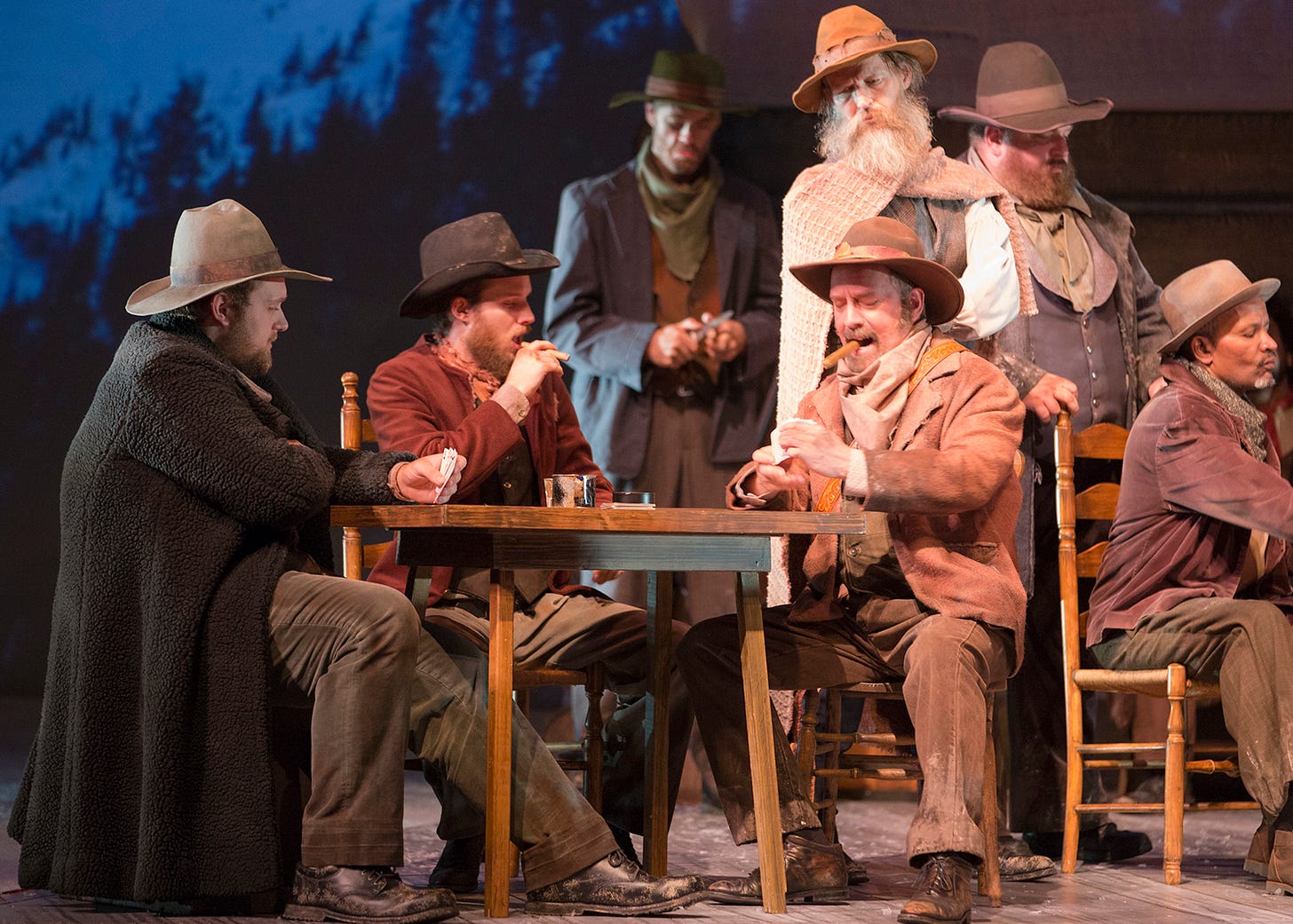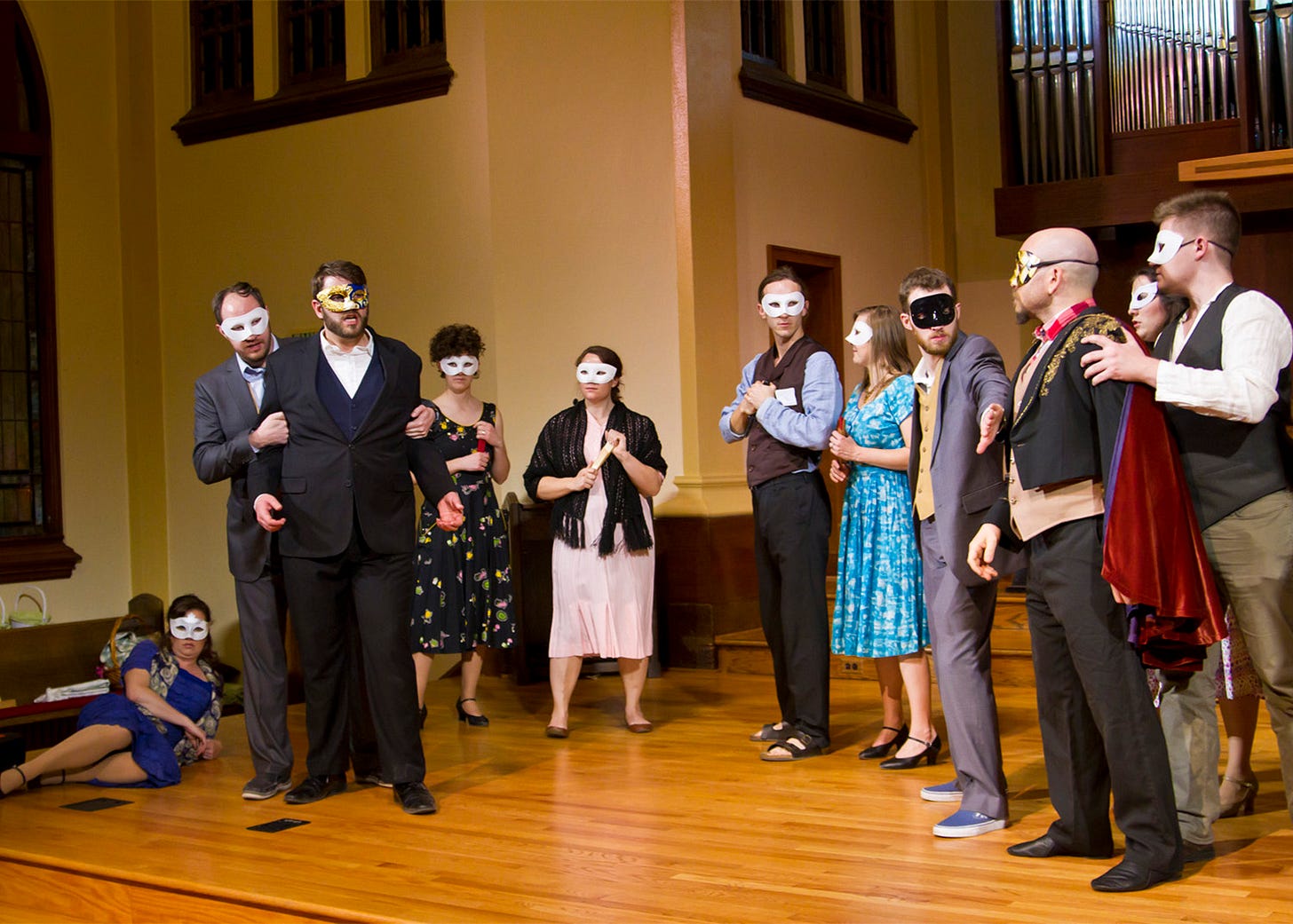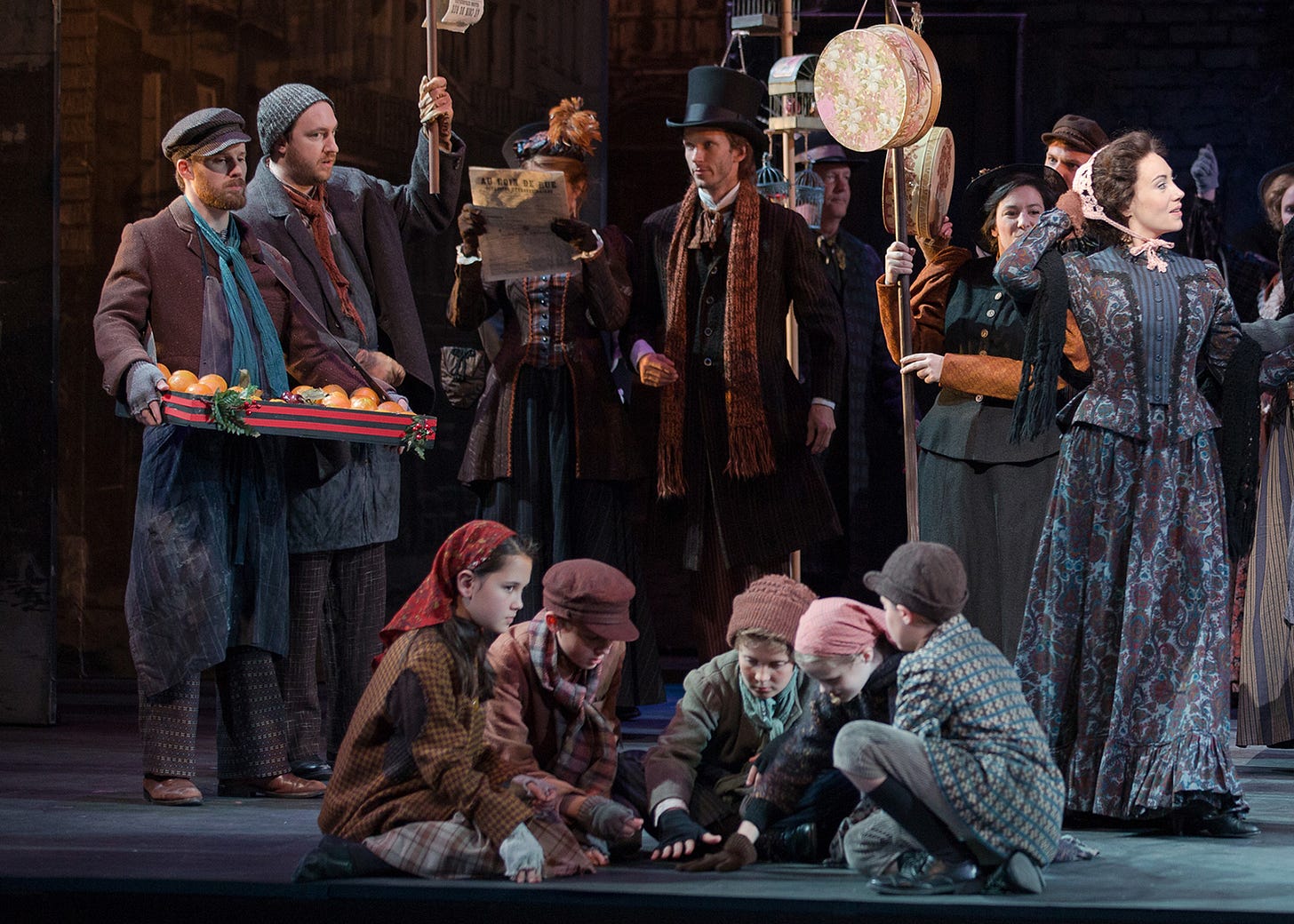Five Ways Being an Opera Singer Makes Me a Better Entrepreneur
Onstage and off, life is a grand performance, and the skills from one transfer easily to the other.
One of the stranger chapters of my life was a brief period where I trained as a classical singer and spent time singing opera.
With a wife and five kids, I knew that being a full-time professional singer was not an option for me, but I did pursue it as much as I could to see how far I could take it.
As it turned out, I was able to go a lot further than I initially expected.
As I’ve shared in detail on my podcast before, I wasn’t even trying to become an opera singer at all: I was initially sucked into it (like many are) simply by wanting to become a better singer for fun, and it grew from there.
When I started voice training with “Dr. John,” my instructor (a graduate of Juilliard and a former opera singer with the Metropolitan Opera in New York), it was almost a lark. I didn’t take it very seriously at all.
I just told him, “I want to get better at singing,” so we started out with jazz standards and show tunes. It was his idea to dig deeper, helping me discover that I was, in fact, a decent lyric tenor and to introduce me to the Italian opera repertoire, which changed me forever.
That unexpected turn in my life was so significant that I decided to go back to school and pursue music in college. I had been able to support a family on one income without a college degree; it was clear that not having one wasn’t that much of an impediment to my financial success.
It was actually my wife who said out loud what we’d both been thinking for a while: “You’ve already proven you don’t need a degree… so if you’re going to go back to college, why not study what you love?”
That was a great idea. So, I did.
I enrolled as a music major at the local university and soaked it all up. I inhaled everything I was learning: piano lessons, sight singing and ear training, jazz history, classical music history, Latin, and more.
It was a very difficult—though rewarding—season of life. I worked full-time, went to school part-time, took voice lessons every week on the side, and sang in a chamber choir.
At one point, I was even offered a scholarship to play the tuba in the pep band, and I initially said yes, and started playing fight songs and rock and roll covers for a few weeks until my wife told me I had one too many things on my plate and needed to choose.
I loved the tuba but decided that playing “Louie, Louie” at college basketball games was not at the top of my list.
Life was full of working, studying, reading, practicing, auditioning, performing, parenting, and taking tests and quizzes. It was very exhausting but fulfilling.
Fast forward a couple of years, and I moved my family about two hours north, from southern Colorado to an area northwest of Denver. That’s when a boatload of major life changes happened all at once.
In the span of about one and a half years, I applied to be a voice student at a college in Boulder (and failed), joined an opera company in Boulder, joined an opera company in Denver, joined a Christmas Caroling troupe, got laid off from my job, became a student at a college in Denver, and turned 32.
That’s also when I decided to start my own business.
Well, to be precise, that’s when I decided to take my existing business full-time.
I started my business back in 2008, so I had already been self-employed on and off for eight years, but almost never full-time for more than a few months at a time. Up until that point, self-employment had always been a fallback plan in case of emergency when I got laid off from full-time employment.
Surprisingly, I had to rely on my own company as a “Plan B” far more often than I initially anticipated: after getting laid off from three separate companies, my spotty employment history made my resume look like a road sign with shotgun holes blown in it by a drunk redneck.
I was finally laid off for the third time on Tuesday, August 22nd, and the very next day, I had my first day of class at my new college in Denver and celebrated my 32nd birthday. (Well, there wasn’t much celebration that day: it was more like “Ron’s Birthday, Observed.”)
But on that day, I decided, then and forever: “That’s it: that was the last time. I will never ever get laid off again. I won’t let them lay me off. I can take it three times, but not a fourth time.”
As I’ve recently been pondering all of this, I’ve come to the surprising conclusion that my dabbling in singing for a few professional companies right around that same time turned out not to be as much of a distraction as I might have initially thought.
When I was in the thick of it, doing homework backstage between scenes, while FaceTiming my wife to check in and see if the kids were in bed yet, I felt more than a twinge of guilt, wondering: “What am I even doing here? Am I being irresponsible right now?” and not being sure of how to answer that.
But looking back now, I actually believe that my experiences onstage and backstage were actually very helpful in equipping me with the kind of skillset I needed off-stage to be a full-time entrepreneur.
Here are a few conclusions I’ve come to recently, about how being an opera singer made me a better entrepreneur.
#1: Auditions are sales pitches. Being good at auditions = being a good salesman.
In his book “Audition,” author Michael Shurtleff says: “Auditions are the worst form of theater ever invented, but no one has yet come up with a better solution for finding actors.” This is a painfully accurate assessment.
It’s as true for singers as it is for actors: having to audition for a role is the worst thing singers ever do, but it’s also the only way you can actually get a role.
That’s just the cold, hard truth of the life of a performer. It’s the thing we hate the most, but it’s also the way you get to keep being a performer: you have to keep auditioning in order to land new roles, which is how you stay employed.
The same is true for an entrepreneur: sales pitches with prospective clients are just like auditioning for a panel of judges. You give your best pitch (the performance), and they decide whether you’re worthy of the role (the job).
Most entrepreneurs I know—especially solopreneurs—absolutely, positively hate sales. If there’s one thing they could outsource, it’s sales. But sales is also the most crucial job of any entrepreneur: it’s the one thing you can’t outsource.
Because, especially for small businesses, the prospective client is going to decide whether you can handle their business based on how you handle the sales process. Rightly or wrongly, that’s the measuring stick they use: if you’re going to choke on something small like a sales pitch or an audition, how can you be trusted to help build their company or fill their auditorium when millions of dollars or thousands of fans are at stake?
Auditions are awful, horrible experiences that make many opera singers so nervous that they tremble, sweat, and sometimes even vomit before going on stage. The same is true for me before I make a sales pitch.
…but I have to. If I don’t audition, I won’t get the role. If I don’t sell, I won’t get the job.
#2: You’re responsible for learning your role and getting your own training.
When you’re hired for a performance at an opera company, you’ll be handed a score and told, “Learn your part by September 1st,” or something similar.
That’s it. It’s all up to you. They will not train you, hold your hand, or remind you. When they say, “You have to be off book by November 2nd,” they’re not joking.
If you fail, you will be fired.
It’s your responsibility to learn your part, make your cuts, and memorize your lines without anyone else’s assistance. If you need help, you may have to hire someone else (like a vocal coach) to get you through it.
Of course, there is a little bit of wiggle room once rehearsals start, and you can ask the chorus master (usually) or perhaps even the maestro (rarely) for direction, but really, it’s all on you to show up on the first day of rehearsals knowing when to come in, what to sing, and have a general idea of the opera you’re performing.
You’re also expected to know, to a certain extent, who the composer was, when the work was composed, what the words mean (even though they’re rarely in English), who your character is, what your motivation is, how you’ll stand on the stage, and what the work is about.
“Why are we even here? What does it all mean? What do we want the audience to take away from this?” — These are questions you should know the answer to before you even get on the stage.
Basically, when you get a gig as a professional singer, all of the responsibility is on you to show up prepared on day one and remain in control the entire time.
In the business world, we’d call this being “self-motivated,” but there are some people who just can’t do it. Those people usually make very poor entrepreneurs.
Being an opera singer is exactly like owning your own business. After you’ve nailed your sales pitch (passed your audition), you can’t then ask the client (or maestro): “I don’t know what this means… can you help me?”
No, you have to figure that out on your own time.
You’re the professional: they’ve hired you because of your skills, and it’s not good enough to say your skills are: “I’m good at standing on stage and doing what I’m told.”
You have to have gumption and be assertive, do your own research, hire your own help if needed, and find a way to show up prepared and know your material on time, every time.
Here's a great example. Colorado is a hard state to learn foreign languages like German, Italian, and French. Spanish is the only exception, which is everywhere, since the state is filled with Hispanic immigrants, trying to learn a European language is very difficult.
In my case, when I started studying opera, it became apparent that I’d need to learn Italian. But where on earth could I do that? I tried signing up for Italian language classes at the university in Colorado Springs, but guess what? They didn’t have any classes for that: there wasn’t enough demand. Or, sometimes, the college would say they were going to offer an Italian class, so I’d register for it, but then they’d cancel it once the semester started because not enough people signed up.
What do you do in that circumstance? You don’t give up: you find someone who can help you and figure it out anyway. In my case, I found a private tutor—a woman from Italy—who drove down from Denver to teach lessons in a small group. It was expensive and a big hassle, but it was absolutely worth it.
That’s how I took Italian 101, then Italian 102. When those were done, I was ready for Italian 103, but the other students didn’t want to get that advanced, so they dropped out, and the class was canceled because it would have just been me. But all of that was enough to help me get what I needed: a real, live native Italian speaker teaching the Italian language, focusing on proper diction, and providing crucial clues to the culture and context of what, how, and why Italian words are used.
So, my Italian, it turned out, was just fine. But that was really hard-earned. Nobody was there to help me; I had to fight for it.
That’s what opera singers do. There are no excuses. You need something? You go find it, period. You don’t wait around for somebody else to help you.
That’s also what entrepreneurs do. You need something? You go make it happen—you can’t rely on an employer, or friend, or coworker to hand it to you on a silver spoon.
When I wanted to learn web development in the mid-2000s, I had a similar challenge: I didn’t have any opportunity to enroll in “web development” courses in college since I wasn’t in college at the time, and that wasn’t even a thing, really.
So, I found someone else who could teach me basic HTML/CSS and PHP, then spent many nights and weekends staying up until 3:00 am learning it myself. It was absolutely exhausting, but that was the only option I had. No excuses.
That’s just the way it is as a classical singer and as a business owner.
I spent many a night reading books, watching videos, and asking other people all about “how to build a website in PHP,” and as a singer, I spent many a night reading my Nico Castel books, hand-writing translations in the score, and listening to multiple recordings of the opera in question.
#3: Networking is crucially important; it’s all about who you know (and who knows you).
When I got a paid gig with a Christmas Caroling group, that was an easy sell: I was a shoo-in, and it was one of the few times I didn’t even have to audition. Why? Because the group’s leader knew I was already singing for a professional opera company in Denver. If I could get into that company, I was clearly suited for the job with her.
Most opportunities aren’t that simple, and auditions are still a fact of life in almost all cases. But it is true that life as an opera singer and as an entrepreneur is all about who you know and who knows you.
I got invited to sing with the chorus at the Aspen Music School & Festival because the leader of my chamber choir in Colorado Springs knew the conductor and knew that they needed more tenors. When he asked if she knew anybody who could help out, she contacted me.
Was that opportunity ever posted anywhere in a classified ad or anything like that? I have no idea, but it’s not likely I would have known about it unless my old chamber choir director reached out to me.
After all, I had already moved away from southern Colorado and hadn’t seen her in months. So, it wasn’t like we were going to bump into each other at Tuesday night rehearsals. But because she knew me from before and knew I could be counted on, she connected me with them and gave me a good recommendation. I was flattered, and I got the gig.
The same thing happened at a separate summer music festival. I had never even heard about this particular festival, but my trusty chamber choir director reached out to me once and said, “I have a friend who runs this festival, and she needs more tenors for Stravinsky. Are you interested?” I jumped at the chance.
A summer music festival, singing a Stravinsky ballet… in Russian? Sign me up, man!
That sounded amazing. But again, was this something I even knew about and specifically sought out as an opportunity for myself? Not at all. I was just going about my merry way when a random email came out of the blue telling me about it.
As an entrepreneur, that’s happened to me more times than I can remember. I’m just living my life, and I’ll get a call or an email out of nowhere from someone I’ve never heard of before, saying: “Hi Ron, I was talking to Jason and telling him about this new business I’m starting, and he said I should talk to you about marketing…”
It’s a beautiful thing when that happens: qualified referrals from existing clients are as good as gold, and they’re usually pleasant surprises with the added bonus of being easy to land. If you’ve already done such a good job for your client that they’re willing to recommend you to their friends—without you even asking—you’ve basically already passed the audition.
So, as much as singers might like to pretend that all they need to do is focus on singing and all else will follow, that’s simply not true.
What’s true is that you need to be a good singer, pass auditions, do a good job for the company that hired you, and make a good enough impression as a dependable team player that they’re willing to tell other people about you.
Networking is a crucial skill: knowing the right people can open doors for you that you wouldn’t even know about otherwise.
#4: Rejection is a normal part of the process. It’s awful, but you have to keep going.
I’ve said for years that “singers wake up every morning and eat rejection for breakfast.”
We spend so much of our lives as performers applying for things, competing in things, and auditioning for things and being told: “No” that it’s almost absurd.
Maybe some singers are extremely fortunate, and they don’t hear this often. But most people I know, myself included, experience failure more often than success. And that’s all just a part of how it goes.
You try out for things and get rejected. “Oh well,” you say, and move on. You just can’t get hung up on this, and the word “no” can’t scare you so much that you stop trying.
In my case, for example, I started small and had a lot of success, relatively speaking, but there were bumps along the way:
I auditioned for a chamber choir and got in.
I auditioned for a summer opera program and failed.
I auditioned for the Metropolitan Opera and failed.
I applied to be a vocal student at a college in southern Colorado and got in.
I auditioned for a summer music festival and got in.
I auditioned for the Metropolitan Opera again and failed again.
I applied to be a vocal major at a college in Boulder and failed.
I competed in a singing competition in Denver and failed.
I auditioned for an opera company in Boulder and got in.
I auditioned for an opera company in Denver and got in.
Isn’t that nuts? It’s a wild rollercoaster ride of successes and failures, highs and lows, ups and downs, and you have to hold it all loosely and not be too discouraged by those jerks seated in the back of the room with their stern faces and their stupid clipboards, who write down obnoxious notes about you with their cheap mechanical pencils, judging your every flaw and holding your fate in their hands.
Those people don’t own you. They don’t control your future. If they reject you, it may not even have anything to do with you. It’s hard to keep that in mind, but it’s true. They may be hiring for a very specific role, or look, or feel, and you just might not have it… and you have to be okay with that.
You have to read those emails and open those letters that say: “While our judges were impressed with blah, blah, blah… you were not selected as a finalist, blah, blah, blah,” and just move on without letting them bother you too much.
The same goes in self-employment. Sometimes, I’ll try to pitch my services to someone, and I get excited about the prospect of working with them and start to dream about all the success we’ll have, together, as a team and all the money I can make off a project this size… and I’ll think my initial sales call or meeting went well.
Then I’ll get a terse email from someone who works there, saying, “Unfortunately, we decided to go with another company.”
Ugh. That sucks. It’s an awful feeling.
But you have to get over it. Just move on. It simply wasn’t meant to be, so don’t dwell on it too much.
In short: Try. Fail. Fail again. Fail once more. Don’t stop. Keep going.
#5: Take risks, try shit, and say yes to everything, no matter how absurd.
One of the weirdest experiences of my life was when I was invited to the wedding of one of my best friends, who lived in California. That wasn’t so weird in and of itself, but it turned into a hugely significant challenge because the wedding was on Friday.
I had a dress rehearsal for an opera in Colorado on Thursday, and the performance was on Saturday. I’d have to be in Colorado on Thursday, in California on Friday, and back in Colorado on Saturday. Oof.
How was I going to balance showing up for my first-ever opera at this new company I just joined and also get to see my oldest friend on the most important day of his life?
I just figured it out. That’s how. I found a way to make it happen.
I got a flight that left Denver around midnight on Thursday and a flight that came back around noon on Saturday. Barring any missed connections or delayed flights, that meant I might, in fact, be able to have my cake and eat it too: I could be at the mandatory dress rehearsal on Thursday night and the actual performance on Saturday afternoon and still miraculously squeeze in a wedding in another state on the Friday in between.
Looking at my schedule for the week, it looked completely insane, and I wondered if it was even worth it. Why would I be killing myself to make two things happen in two different states? Why not just say “no” to one of them? It was too much. Wasn’t it?
But I tried it. At the end of our rehearsal at exactly 8:00 pm Thursday night, I helped to clean up the stage at the outdoor bandshell, which was required, and by 9:00 pm, I was released.
Walking through the grass right as the sprinklers turned on, I was now soaking wet, rolling my luggage through the darkness, and finding my way to the bus station to hop on a ride to the airport.
I washed off my stage makeup in the Greyhound Bus bathroom where homeless people had left drug pipes on the ground, then made it onto the very last bus of the evening, heading to the Denver airport. Once there, I went through security, found a quiet hallway, and tried to sleep for a few hours with my carry-on bag as my pillow.
My flight left early in the morning, and when I landed in LAX, I rented a car, drove two hours in traffic to Oxnard, where the wedding would be, checked into my Airbnb, took a shower, and then headed to the wedding venue just in time.
The wedding went on without a hitch, and I hung out until the reception was over, then headed back to my rented space, with just enough time to spend about 10 minutes on Silver Strand beach, dipping my toes in the water just before midnight, then it was time to sleep.
Up again at 6:00 in the morning, I hit the road to get back to the airport, where my flight back left around 9:00, giving me just enough time to drive to LAX and turn in my rental car before taking off. After landing around 1:00 in the afternoon, I got a bus ride right back to downtown Boulder, where I had left not 48 hours earlier, took my luggage off the bus, and rolled it down the sidewalk from the bus station back to the bandshell just in time to put my stage makeup back on for our actual performance.
As far as anybody else knew, there was nothing special about any of this: Ron, their newest tenor, went home after rehearsal just like everybody else on Thursday night and came to the park from his house, just like everybody else, this Saturday afternoon.
And that’s exactly the way it should have been.
They didn’t know anything about my riding a bus to the airport, flying to Los Angeles, renting a car and driving to Oxnard, then reversing all those steps, going through security, packing a carry-on bag, putting on and taking off makeup, going to a wedding, staying awake on the road, getting up early, and all that other shit related to pulling off this amazing (and expensive!) endeavor.
But hey, the show must go on! That’s the life of an opera singer. It’s crazy, but somehow, it works.
The same goes for being a business owner. I have a hundred other stories about my crazy life trying to create a business from scratch, cash-flowing a profitable company while raising children, going back to school, and just trying to survive.
And it’s all worth it… or at least that’s the assumption I’m still working with.
So, when I get wild calls out of the blue from strangers I don’t know who say: “I’ve just invented a product that is going to revolutionize the way people use toilets, can you help me with marketing?”
I say, “Yes.”
When my dad calls me and says: “I just got a job working for a company in the Midwest that makes insect incubators for Drosophila melanogaster researchers who work on genetic studies, can you meet me in San Diego for the Fruit Fly conference in a few weeks and help me run the booth?”
I say, “Yes.”
When someone says: “I’m working on a housing project that involves making technology to solve complicated supply-chain challenges, and we’re trying to see if we can rent some C-130 Hercules airplanes from the military to drop off giant shipping containers out in the remote wilderness… can you fly out here and talk to us about marketing and sales?”
I say, “Yes.”
Why not? That’s what makes life interesting.
I’ve got to give a lot of credit where it’s due: becoming an opera singer was the wildest, craziest, strangest, least logical thing I’ve ever done. And what a treasure trove of experiences it’s given me, and the ability to hone the crucial skills needed for being an entrepreneur, including being good at sales, having self-discipline, being self-directed, being resilient in the face of being told “no,” saying “yes” to everything, trying shit, and just seeing where it all takes me.
That is far, far more interesting than a life I could have had if I were working as a code monkey in a cubicle somewhere, sitting in the same chair for 10 or 15 years, getting an annual “cost of living increase,” and celebrating a modest “two weeks of PTO” every year.
Boo... that’s boring! I need blood… and guts… and opera in my life!
I need to do interesting and meaningful things while working for myself, calling my own shots, and being responsible for me and me alone.
Being an opera singer has made me a better entrepreneur in a lot of ways. I’m just now figuring out how.
Opera singers aren’t “normal” people.
Entrepreneurs aren’t “normal” people either… not even close.
I’m glad I’m not normal. It makes my life so much more interesting.
















